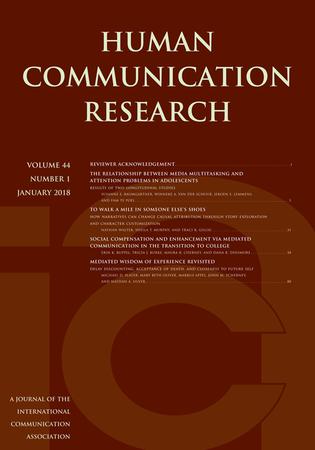The misinformation recognition and response model: an emerging theoretical framework for investigating antecedents to and consequences of misinformation recognition
IF 3.3
1区 文学
Q1 COMMUNICATION
引用次数: 0
Abstract
Abstract Although research on misinformation and corrections has recently proliferated, no systematic structure has guided the examination of conditions under which misinformation is most likely to be recognized and the potential ensuing effects of recognition. The Misinformation Recognition and Response Model (MRRM) provides a framework for investigating the antecedents to and consequences of misinformation recognition. The model theorizes that how people cope with exposure to misinformation and/or intervention messages is conditioned by both dispositional and situational individual characteristics and is part of a process mediated by informational problem identification, issue motivation, and—crucially—recognition of misinformation. Whether or not recognition is activated then triggers differential cognitive coping strategies which ultimately affect consequent cognitive, affective, and behavioral outcomes. Working to explore the notion of misinformation will be more fruitful if researchers take into consideration how various perspectives fit together and form a larger picture. The MRRM offers guidance on a multi-disciplinary understanding of recognizing and responding to misinformation.错误信息识别和反应模型:研究错误信息识别的前因和后果的新兴理论框架
虽然最近对错误信息和更正的研究激增,但没有系统的结构指导检查错误信息最有可能被识别的条件以及识别的潜在后续影响。错误信息识别和反应模型(MRRM)为研究错误信息识别的前因和后果提供了一个框架。该模型的理论是,人们如何应对错误信息和/或干预信息的暴露是由性格和情境个人特征决定的,并且是由信息问题识别、问题动机和至关重要的错误信息识别介导的过程的一部分。无论识别是否被激活,都会触发不同的认知应对策略,最终影响随之而来的认知、情感和行为结果。如果研究人员考虑到不同的观点如何结合在一起并形成一个更大的图景,那么探索错误信息的概念将会更富有成效。MRRM为认识和应对错误信息提供了多学科理解的指导。
本文章由计算机程序翻译,如有差异,请以英文原文为准。
求助全文
约1分钟内获得全文
求助全文
来源期刊

Human Communication Research
COMMUNICATION-
CiteScore
8.20
自引率
2.00%
发文量
28
期刊介绍:
Human Communication Research is one of the official journals of the prestigious International Communication Association and concentrates on presenting the best empirical work in the area of human communication. It is a top-ranked communication studies journal and one of the top ten journals in the field of human communication. Major topic areas for the journal include language and social interaction, nonverbal communication, interpersonal communication, organizational communication and new technologies, mass communication, health communication, intercultural communication, and developmental issues in communication.
 求助内容:
求助内容: 应助结果提醒方式:
应助结果提醒方式:


